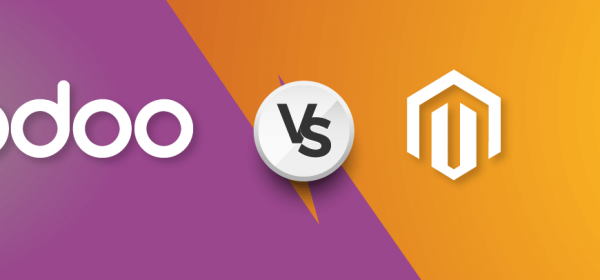While Magento is the leading E-commerce development platform in the market with almost 250k websites using Magento, Odoo, formerly known as OpenERP recently entered in this highly-competitive ecommerce software market. There is no doubt about the authority and popularity of Magento as an ecommerce platform. But Odoo Ecommerce is a force to be reckoned with. While Magento and other ecommerce systems are standalone front end systems, Odoo has surfaced as an integrated suite of business applications. Which means you can seamlessly integrate your ecommerce store with accounting, inventory management, sales and marketing, and various other systems.
But is this reason enough to go for Odoo, especially if it doesn’t have as advanced ecommerce functionalities as Magento? Given below is a brief comparison of both the platforms based on various parameters. We’ve tried covering all the points that can help you make an informed decision.
Features and Functionalities
Both platforms excel in terms of scalability. Both have community and cloud versions.
Odoo has a convenient user interface and offers various features including easy configuration, integration, and customization. It is a modular platform with a consolidated strategy.
Magento, on the other hand, is the most powerful ecommerce system available which is open source and available for free (to a certain extent) and is SEO friendly. Also, a powerful CMS and has a massive community of active developers always coming up with new functionalities and extensions to suit any kind of ecommerce requirement.
Backend functions
Odoo is a good start for small to medium businesses as it doesn’t only provide an easy way to manage all business operations, but has a strong back-end process. If you are using Odoo, you can manage accounting, inventory, purchase, CRM, etc. all from the same platform using a range of Odoo apps.
On the other hand, if you are using Magento it has an advanced backend but only for ecommerce related functions – catalog management, order management, customer management, etc. So, if you want to manage your inventory, accounting or purchase, you will have to pay extra for Magento extensions. One good thing here is that the Magento developers committee is extremely active coming up with powerful extensions.
Setup and Customization
In terms of usability, Odoo is easier to set up and use. It doesn’t need much technical expertise to set up an Odoo store. There are many apps available at the Odoo store which enhances your ecommerce store without employing any professional to get it aligned with your e-commerce website.
While Magento might require IT professionals to get it working, the results are definitely worth it. And the advantage that Magento has in this regard is that there are many certified Magento developers available in the market. So if you need professional help setting up your Magento store, you can easily do so by hiring Magento development services. Magento also has a huge community of extension developers. So you can add any functionality to your online store using a range of Magento extensions.
Payment Gateway
Redirect Payment Gateway and PayPal are available with both the platforms but server to server payment gateway is available only on Odoo for now. Odoo can also manage recurring payments. Magento offers a secure and safe payment gateway for the buyer as well as the seller. Both platforms provide multi-currency options to facilitate sales in different geographies. Each of the platforms supports almost all payment gateway solutions. But since Magento is the more mature and popular platform, most payment gateways have readymade integrations for Magento.
Reports
It is important for any e-commerce to generate accurate and proper reports that lead to business growth. Both Magento and Odoo Enterprise Resource Planning generate precise sale reports along with inventory, product performance, and sales summary reports. While Odoo also provides the Subscriptions KPIs, Magento offers a Site search report which is not currently available with Odoo.
An Overview
Odoo
Odoo aids your business for further growth and boosts the productivity of e-commerce to get maximum return on investment. It performs multiple tasks within a single platform and manages small businesses with complex workflow with much ease. Odoo ecommerce is natively integrated with various other business apps. It also offers several free customizable modules that smoothen the overall running of the business.
Magento
Magento is undeniably one of the best ecommerce platforms one can opt for. The platform is comprehensive with its features, functionalities and is definitely dominating the market for all the right reasons. The e-commerce sites built on Magento are customizable according to specific business requirements and can be updated easily. It makes the online shopping experience better and simpler. A majority of the prominent developers choose Magento for its safety, reliability and other unique features.
Conclusion
Should you choose Magento?
Magento is the market leader when it comes to ecommerce. It has quite a few things going for it – a robust and stable platform, SEO friendliness, a huge community of developers offering various extensions, themes, services, etc. So if your requirement is only to set up an online store where you don’t need a lot of integrations with other business applications, then you should go for Magento.
Should you choose Odoo?
If Magento is the king, Odoo is the upstart challenger. It has many hurdles to cross before it can be a serious threat to Magento. But that’s from marketing and brand point of view. Looking at purely from the product point of view, Odoo is also a robust platform that comes with a very compelling USP of an entire suite of business applications. And you wouldn’t need to buy expensive extensions and your ecommerce business can easily integrate with your ERP system. Odoo ecommerce is ideal for small and medium-sized businesses who are either already using Odoo ERP or want a whole ERP solution that’s easy on the pocket, not just an online store.
Many companies around are getting the best of both worlds. Many businesses are using Magento on the front end and Odoo at the back end given their strengths in the respective fields. That’s a route you can take if you want the best of both worlds, though you will have to hire some to integrate Magento with Odoo.
Editor’s Note: This blog has been updated, keeping in mind the recent changes in the ecommerce industry, and republished to help make users an informed decision.
All product and company names are trademarks™, registered® or copyright© trademarks of their respective holders. Use of them does not imply any affiliation with or endorsement by them.





